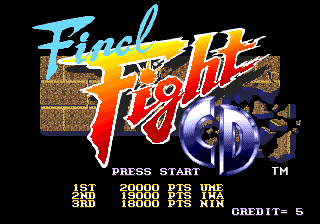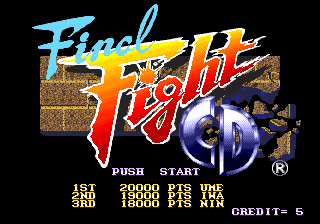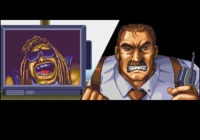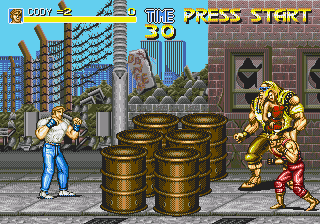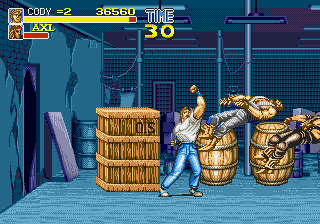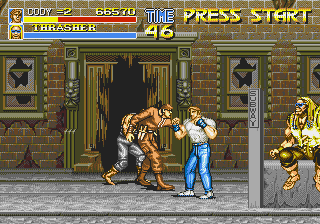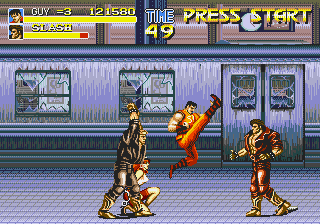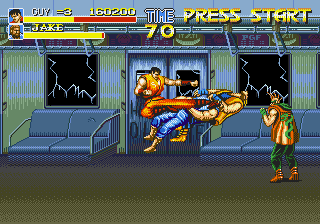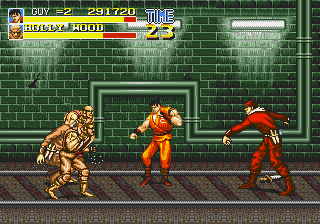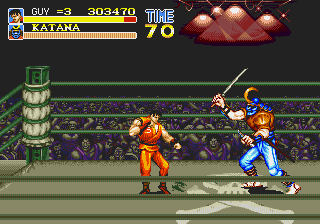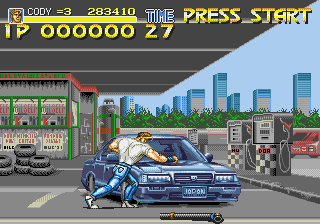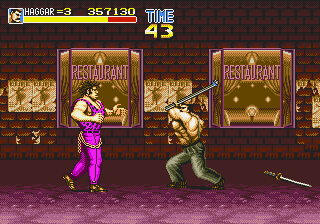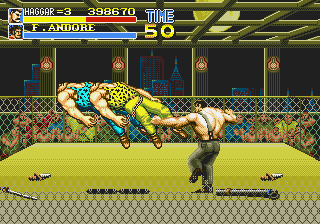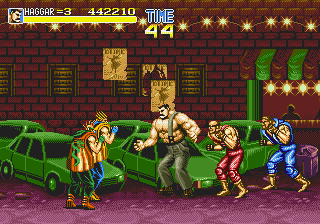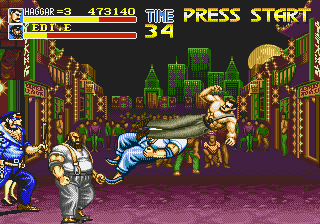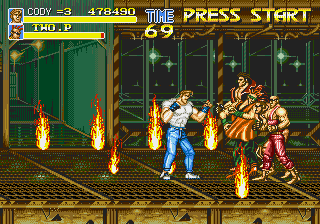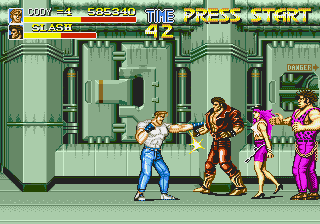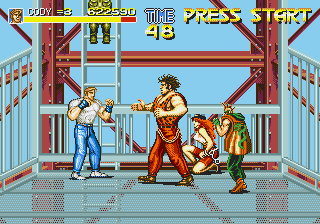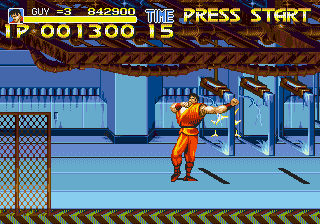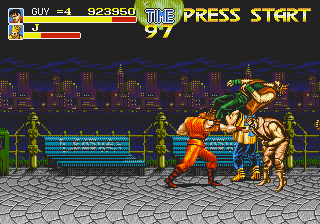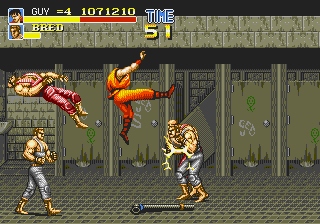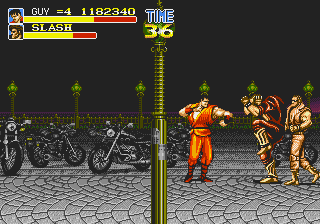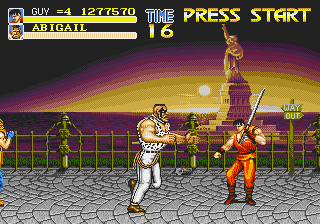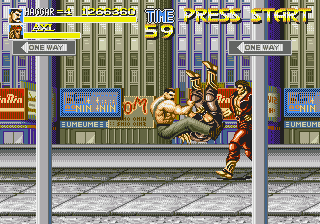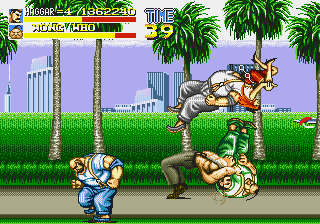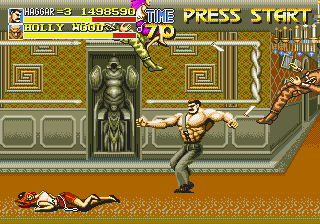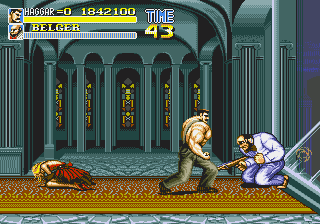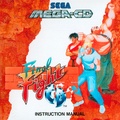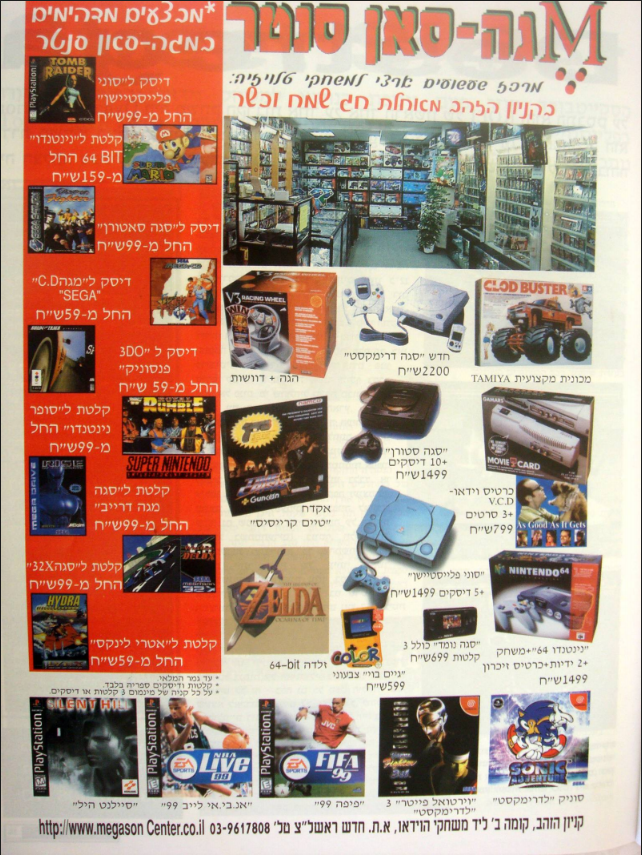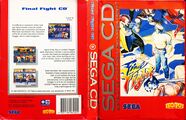Difference between revisions of "Final Fight CD"
From Sega Retro
Hyperspeed34 (talk | contribs) |
|||
| Line 4: | Line 4: | ||
| tab1=NTSC-U/PAL | | tab1=NTSC-U/PAL | ||
| tab2=NTSC-J | | tab2=NTSC-J | ||
| − | | publisher=[[Sega]] | + | | publisher={{company|[[Sega Enterprises, Ltd.]]|region=JP}}, {{company|[[Sega of America]]|region=US}}, {{company|[[Sega Europe]]|region=EU}} |
| developer=[[A-Wave]] | | developer=[[A-Wave]] | ||
| support={{company|[[T's Music]]|role=audio}} | | support={{company|[[T's Music]]|role=audio}} | ||
| Line 44: | Line 44: | ||
| otherformats={{NonSega|Arcade|CPC|Amiga|ST|C64|GBA|Spectrum|SNES}} | | otherformats={{NonSega|Arcade|CPC|Amiga|ST|C64|GBA|Spectrum|SNES}} | ||
}} | }} | ||
| − | '''''{{PAGENAME}}''''' (ファイナルファイトCD) is a [[Sega Mega-CD]] beat-'em-up game developed by [[A-Wave]] and published by | + | '''''{{PAGENAME}}''''' (ファイナルファイトCD) is a [[Sega Mega-CD]] beat-'em-up game developed by [[A-Wave]] and published by Sega. An enhanced port of the titular 1989 [[Capcom]] arcade game ''[[wikipedia:Final Fight (video game)|Final Fight]]'', it was first released in Japan in April 1993{{ref|https://web.archive.org/web/20200622192404/https://sega.jp/history/hard/mega-cd/software.html}} to critical and commercial success. It has since developed a reputation as one of the best games for the Mega-CD. |
==Story== | ==Story== | ||
Latest revision as of 01:39, 20 November 2024
| |||||||||||||||||||||||||||||||||||||||||||||||||||||||
| Final Fight CD | |||||||||||||||||||||||||||||||||||||||||||||||||||||||
|---|---|---|---|---|---|---|---|---|---|---|---|---|---|---|---|---|---|---|---|---|---|---|---|---|---|---|---|---|---|---|---|---|---|---|---|---|---|---|---|---|---|---|---|---|---|---|---|---|---|---|---|---|---|---|---|
| System(s): Sega Mega-CD | |||||||||||||||||||||||||||||||||||||||||||||||||||||||
| Publisher: Sega Enterprises, Ltd. (JP), Sega of America (US), Sega Europe (EU) | |||||||||||||||||||||||||||||||||||||||||||||||||||||||
| Developer: A-Wave | |||||||||||||||||||||||||||||||||||||||||||||||||||||||
| Supporting companies: T's Music (audio) | |||||||||||||||||||||||||||||||||||||||||||||||||||||||
| Distributor: Ecofilmes (PT), Tec Toy (BR) | |||||||||||||||||||||||||||||||||||||||||||||||||||||||
| Licensor: Capcom | |||||||||||||||||||||||||||||||||||||||||||||||||||||||
| Original system(s): Capcom CPS-1 | |||||||||||||||||||||||||||||||||||||||||||||||||||||||
| Developer(s) of original games: Capcom | |||||||||||||||||||||||||||||||||||||||||||||||||||||||
| Genre: Action[1][2] | |||||||||||||||||||||||||||||||||||||||||||||||||||||||
| Number of players: 1-2 | |||||||||||||||||||||||||||||||||||||||||||||||||||||||
| |||||||||||||||||||||||||||||||||||||||||||||||||||||||
|
Final Fight CD (ファイナルファイトCD) is a Sega Mega-CD beat-'em-up game developed by A-Wave and published by Sega. An enhanced port of the titular 1989 Capcom arcade game Final Fight, it was first released in Japan in April 1993[2] to critical and commercial success. It has since developed a reputation as one of the best games for the Mega-CD.
Contents
Story
The game is set in a fictional city on the Atlantic coast of the United States named Metro City, a city plagued by alarming levels of crime and violence. When the new mayor, pro wrestler turned politician Mike Haggar, promises to clean up the city, the Mad Gear Gang, under the leadership of the crooked businessman Belger, kidnaps his daughter Jessica and warns him not to interfere. When Haggar finds out about his daughter's abduction, he becomes furious and decides to take his fight against Mad Gear to a personal level.
Seeking additional manpower, Haggar recruits Cody Travers, an expert fighter and Jessica's boyfriend, and Guy, a ninja in training and Cody's good friend and rival. The three dedicate themselves to the complete eradication of the Mad Gear Gang and to rescue Jessica from their clutches.
Gameplay
The game is a belt-scrolling beat-'em-up that can be played by up to two players simultaneously. Gameplay consists of continually moving to the right, defeating any enemies that appear on the way to each stage's boss with a variety of hand-to-hand attacks, such as punches, kicks, and throws. Player can choose between three main characters, each with his own fighting style and attributes. The game is split into six areas, each representing a different part of Metro City. Rounds are split into several smaller sub-stages. At the end of each stage is a powerful boss enemy that must be defeated before continuing.
Characters move by pressing the D-Pad in any direction and jump with ![]() or
or ![]() . Characters attack with
. Characters attack with ![]() . Each character has a basic combo that can performed by rapidly hitting the attack button, several attacks that can be performed while in the air, and the ability to grab opponents by walking close to them. While grappling an enemy, the character can either attack an enemy three times before letting them go or throw them in another direction. Enemies can be thrown at each other for additional damage. All three characters also have a special attack, performed with
. Each character has a basic combo that can performed by rapidly hitting the attack button, several attacks that can be performed while in the air, and the ability to grab opponents by walking close to them. While grappling an enemy, the character can either attack an enemy three times before letting them go or throw them in another direction. Enemies can be thrown at each other for additional damage. All three characters also have a special attack, performed with ![]() +
+![]() or
or ![]() +
+![]() , that knocks away all opponents surrounding them. This attack costs a small amount of health if it connects and cannot be performed if the player does not have enough health. Barrels, trash cans, and other objects can be broken to reveal food to restore health, items which increase the player's score, and weapons (knives, swords, and pipes). Items are picked up by pressing
, that knocks away all opponents surrounding them. This attack costs a small amount of health if it connects and cannot be performed if the player does not have enough health. Barrels, trash cans, and other objects can be broken to reveal food to restore health, items which increase the player's score, and weapons (knives, swords, and pipes). Items are picked up by pressing ![]() while standing over them.
while standing over them.
Health gauges are displayed for both player and enemy characters. The game ends if the player's character loses all of his health, though it can be continued from the point where the character was defeated if the player has credits remaining.
Exclusive to this version of the game is a Time Attack mode where players fight an onslaught of enemies for either 99 seconds or until they are defeated twice. Score is counted by the number of enemies defeated before the mode ends.
Characters
| Guy | |
|---|---|
| Guy is a Bushido ninja and a friend of Haggar and Cody. While he has the weakest attack strength, he moves faster than both Haggar and Cody. He has the ability to leap off the sides of the screen and performs better with swords than the other characters. His special maneuver is the bushin senpuukyaku (武神旋風脚), a spinning whirlwind kick. | |
| Cody | |
| Cody is a street fighter and Jessica's boyfriend. He has an equal balance of attack strength and speed. He is able to knock incoming knives out of the way with an attack, and he fights better with them than the other characters. His special move is the crack kick, a jumping kick. | |
| Haggar | |
| Haggar is the mayor of Metro City and a former pro wrestler. He is Jessica's father. He has the highest attack power, although he has the slowest speed. His special ability is the double lariat (also called the spinning clothesline), and he uses the pipe more effectively than the other characters. He has three grapple moves: he can grab opponents and headbutt them as well as perform a suplex or a piledriver. |
Weapons
Weapons knock opponents down when they connect. They have limited uses and disappear if the player is disarmed by an enemy too much or moves to a new area.
| Knife | |
|---|---|
| Knives can be thrown across the screen at enemies as a projectile weapon. Cody can also use knives to stab enemies in close range. | |
| Sword | |
| Swords provide extra range. There are two swords, the Masamune and the slightly stronger Muramasa. Guy, the sword expert of the trio, is more swift and deadly with them. | |
| Pipe | |
| An iron pipe. Like swords, pipes are especially effective against clumped together enemies. Haggar attacks faster and has longer reach than the others with pipes. |
Rounds
| The Slums | |
|---|---|
| The Subway | |
| Bonus Round 1 | |
| The West Side | |
| Industrial Area | |
| Bonus Round 2 | |
| Bay Area | |
| Uptown | |
History
Legacy
The game was re-released on all versions of the Mega Drive Mini 2 in 2022.
Versions
Though restricted by the 64-color palette and an on-screen limit of four enemies at a time (in contrast to the arcade's whopping ten enemies on-screen), the game offers an arranged CD soundtrack, voice-acted cutscenes and an exclusive time attack mode. Content-wise, the Mega-CD version is a more complete port of the game than the earlier Super NES version published by Capcom in 1990, as it contains all three playable fighters and all six stages, as well as retaining the two-player co-op mode from the arcade.
When brought to the Western market, the female characters Poison and Roxy were censored so that they wore less revealing clothing. The introduction was also altered slightly as Jessica was not wearing a shirt in the Japanese version. The boss characters Damnd and Sodom were renamed to Thrasher and Katana respectively.
The PAL version has one less credit than the Japanese version, health restoring items seem to appear less frequently, a short dialogue between Cody and Guy during the ending was cut, and a palette bug can happen in the bar in the West Side stage, causing people and the barkeeper to have a brownish tone. The PAL version was partially speed optimized, as forcing the game into 60 Hz mode makes it run too fast.
Production credits
Digital manuals
Magazine articles
- Main article: Final Fight CD/Magazine articles.
Promotional material
Artwork
Physical scans
| 81 | |
|---|---|
| Based on 39 reviews | |
Technical information
- Main article: Final Fight CD/Technical information.
References
- ↑ File:FinalFightCD MCD JP Box Back.jpg
- ↑ 2.0 2.1 2.2 https://sega.jp/history/hard/mega-cd/software.html (Wayback Machine: 2020-06-22 19:24)
- ↑ https://groups.google.com/g/rec.games.video.sega/c/bJ1t9ysFKKs/m/Sh4ls9AyslUJ
- ↑ GamePro, "July 1993" (US; 1993-xx-xx), page 63
- ↑ 5.0 5.1 5.2 Sega Power, "August 1993" (UK; 1993-07-01), page 60
- ↑ 6.0 6.1 MegaTech, "May 1993" (UK; 1993-04-23), page 84
- ↑ Mega, "May 1993" (UK; 1993-04-15), page 51
- ↑ Video Game, "Outubro 1993" (BR; 1993-xx-xx), page 6
- ↑ Select Round, "Septembre 1993" (FR; 1993-xx-xx), page 2
- ↑ 10.0 10.1 Megablast, "4/93" (DE; 1993-09-29), page 35
- ↑ Sega Magazin, "September/Oktober 1993" (DE; 1993-09-01), page 19
- ↑ Megazone, "October 1993" (AU; 1993-xx-xx), page 43
- ↑ File:Final Fight MCD credits.pdf
- ↑ 1700 igr dlya Sega, "" (RU; 2001-xx-xx), page 118
- ↑ Beep! MegaDrive, "April 1993" (JP; 1993-03-08), page 22
- ↑ Consoles +, "Mars 1993" (FR; 1993-0x-xx), page 74
- ↑ Computer & Video Games, "June 1993" (UK; 1993-05-15), page 48
- ↑ Digitiser (UK) (1993-07-23)
- ↑ Electronic Games (1992-1995), "August 1993" (US; 1993-07-22), page 85
- ↑ Electronic Gaming Monthly, "June 1993" (US; 1993-xx-xx), page 34
- ↑ Mean Machines: The Essential Sega Guide, "" (UK; 1993-11-18), page 121
- ↑ Famitsu, "1993-04-02" (JP; 1993-03-19), page 1
- ↑ GameFan, "Volume 1, Issue 7: June 1993" (US; 1993-xx-xx), page 16
- ↑ Game Power, "Giugno 1993" (IT; 1993-0x-xx), page 54
- ↑ GamePro, "July 1993" (US; 1993-xx-xx), page 64
- ↑ Hippon Super, "April 1993" (JP; 1993-03-04), page 44
- ↑ Hobby Consolas, "Septiembre 1993" (ES; 1993-xx-xx), page 82
- ↑ Joypad, "Septembre 1993" (FR; 1993-0x-xx), page 77
- ↑ Sega Mega Drive Advanced Gaming, "June 1993" (UK; 1993-04-29), page 48
- ↑ Mega, "May 1993" (UK; 1993-04-15), page 50
- ↑ Mega Action, "July 1993" (UK; 1993-06-17), page 32
- ↑ Mega Force, "Mega-CD Force: Le Supplément Spécial Mega-CD" (FR; 1993-xx-xx), page 12
- ↑ Mega Fun, "09/93" (DE; 1993-08-18), page 36
- ↑ Mega Play, "June 1993" (US; 1993-0x-xx), page 56
- ↑ Mean Machines Sega, "April 1993" (UK; 1993-03-26), page 94
- ↑ Megazone, "October 1993" (AU; 1993-xx-xx), page 42
- ↑ Player One, "Septembre 1993" (FR; 1993-08-xx), page 54
- ↑ ProGames, "Setembro 1993" (BR; 1993-0x-xx), page 34
- ↑ Sega Magazin, "September/Oktober 1993" (DE; 1993-09-01), page 18
- ↑ Sega Pro, "June 1993" (UK; 1993-05-13), page 30
- ↑ Sega Zone, "July 1993" (UK; 1993-06-xx), page 38
- ↑ Sega Force Mega, "September 1993" (UK; 1993-07-22), page 40
- ↑ Sega Force, "1/94" (SE; 1994-01-12), page 22
- ↑ Sega Saturn Magazine, "September 1995" (JP; 1995-08-08), page 85
- ↑ Sonic the Comic, "12th June 1993" (UK; 1993-06-12), page 10
- ↑ Supergame, "Abril 1993" (BR; 1993-04-xx), page 20
- ↑ Super Juegos, "Septiembre 1993" (ES; 1993-0x-xx), page 100
- ↑ Todo Sega, "Septiembre 1993" (ES; 1993-0x-xx), page 38
- ↑ Tricks, "1/95" (RU; 1995-xx-xx), page 22
- ↑ Video Games, "10/93" (DE; 1993-09-29), page 113
| Final Fight CD | |
|---|---|
|
Main page | Comparisons | Maps | Hidden content | Magazine articles | Video coverage | Reception | Technical information
Prototypes: 1993-04-23
| |
| Final Fight games for Sega systems | |
|---|---|
| Final Fight CD (1993) | |
| Final Fight Revenge (1999) | |
| Related games | |
| Saturday Night Slam Masters (1994) | |
| Street Fighter Alpha: Warriors' Dreams (1996) | Street Fighter Alpha 2 (Dash) (1996) | Street Fighter Collection (1997) | Street Fighter Zero 3 (1999) | |
| Street Fighter Alpha 3 (1999) | |
- 1-2 player games
- JP Mega-CD games
- All JP games
- US Mega-CD games
- All US games
- EU Mega-CD games
- All EU games
- DE Mega-CD games
- All DE games
- FR Mega-CD games
- All FR games
- PT Mega-CD games
- All PT games
- UK Mega-CD games
- All UK games
- AU Mega-CD games
- All AU games
- BR Mega-CD games
- All BR games
- KR Mega-CD games
- All KR games
- Mega-CD games
- 1993 Mega-CD games
- All 1993 games
- Mega-CD action games
- All action games
- All games
- Old-style rating (gamesmaster)
- Rating without PDF source
- Update ratings template
- 1 old ratings
- Final Fight CD
- Final Fight (franchise)
- Mega Drive Mini 2 games
